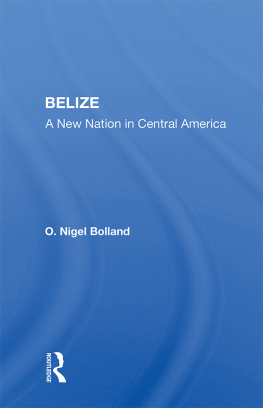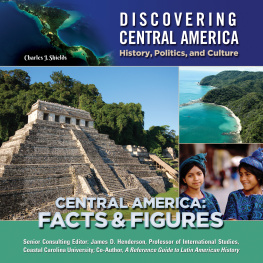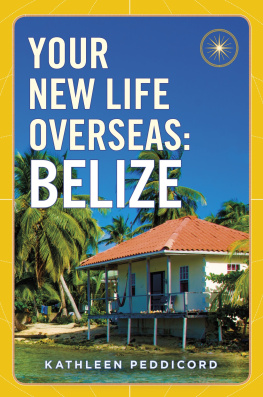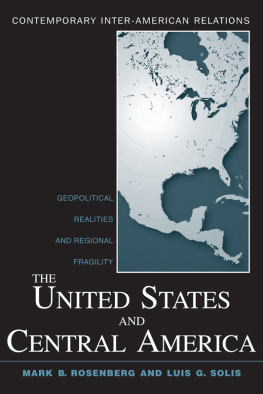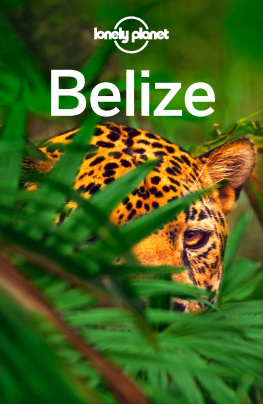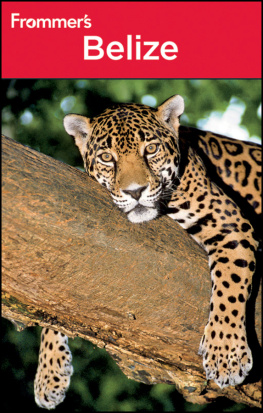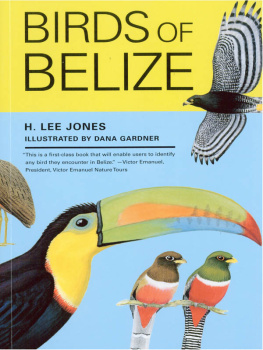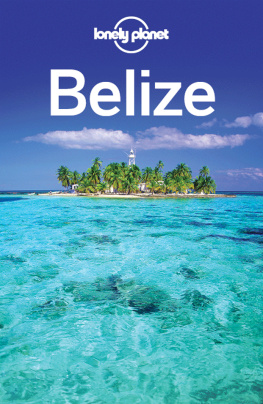BELIZE
Westview Profiles Nations of Contemporary Latin America
Ronald M. Schneider, Series Editor
Nicaragua: The Land of Sandino, Second Edition, Revised and Updated, Thomas W. Walker
Mexico: Paradoxes of Stability and Change, Daniel Levy and Gabriel Szekely
The Dominican Republic: A Caribbean Crcible, Howard J. Wiarda and Michael J. Kryzanek
Colombia: Portrait of Unity and Diversity, Harvey F. Kline
Cuba: Dilemmas of a Revolution, Juan M. del Aguila
Guatemala: A Nation in Turmoil, Peter Calvert Puerto Rico, Pamela S. Falk
Bolivia: Land of Struggle, Waltraud Queiser Morales
Belize: A New Nation in Central America, O. Nigel Bolland Ecuador, William Schodt
Honduras; Caudillo Politics and Military Rulers, James A. Morris Paraguay, Riordan Roett
Uruguay, Martin Weinstein
Available in hardcover and paperback.
About the Book and Author
Independent from Britain only since 1981, the new nation of Belize is situated at the intersection of two cultural spheres: the English-speaking Afro-Caribbean countries and the Spanish-speaking Central American republics. Its scanty population of about 150,000 is culturally heterogeneous, and its various ethnic groups coexist in a complex pattern of social, economic, and political interactions.
This profile of Belize provides a general introduction to both the historical background and the contemporary status of this microstate. Professor Bolland examines the processes of change currently taking place in Belize, including the increasing influence of the United States in the region, the danger of Belize's involvement in the expanding Central American conflicts, and the influx of refugees into Belize from these conflicts. He traces the major shifts in the economy that have occurred since World War II, as well as recent developments in consumption patterns, communications, trade unions, and government economic policies. The emergence and culmination of Belize's independence movement are explored in light of the country's internal politics and regional relations with other Commonwealth Caribbean nations and the Central American republics. The book concludes with an evaluation of Belize's problems and an assessment of its prospects for the future.
O. Nigel Bolland is professor of sociology and chairperson of the Department of Sociology and Anthropology at Colgate University, Hamilton, New York.
To the working people who created Belize, arid especially to the children who will inherit it, with respect
Belize
A New Nation in Central America
O. Nigel Bolland
First published 1986 by Westview Press, Inc.
Published 2018 by Routledge
52 Vanderbilt Avenue, New York, NY 10017
2 Park Square, Milton Park, Abingdon, Oxon OX14 4RN
Routledge is an imprint of the Taylor & Francis Group, an informa business
Copyright 1986 Taylor & Francis
All rights reserved. No part of this book may be reprinted or reproduced or utilised in any form or by any electronic, mechanical, or other means, now known or hereafter invented, including photocopying and recording, or in any information storage or retrieval system, without permission in writing from the publishers.
Notice:
Product or corporate names may be trademarks or registered trademarks, and are used only for identification and explanation without intent to infringe.
Library of Congress Cataloging-in-Publication Data
Bolland, O. Nigel.
Belize, a new nation in Central America.
(Westview profiles. Nations of contemporary Latin
America)
Bibliography: p.
Includes index.
1. Belize. I. Title. II. Series.
F1443.B65 1985 972.82 85-20385
ISBN 13: 978-0-367-00522-1 (hbk)
Contents
, Ronald M. Schneider
Guide
Latin America, although overwhelmingly Luso-Iberian in its European roots, is not exclusively so. During the past quarter century a significant number of former British colonies have gained independence and have thus added to the region's heterogeneity. This evolution has often involved international tension, sometimes to the point of threatened armed conflict. Perhaps the best example of this phenomenon is that involving the small Central American nation of Belize, formerly British Honduras. There the process of independence was delayed and complicated by Guatemala's persistent claims to the area. With fewer than 150,000 inhabitants, Belize could not emerge from under Great Britain's protective shield until a viable agreement could be reached with its much larger neighbor.
In cultural and social terms, this infant nation is essentially a displaced piece of the Caribbeanpart of Central America in only a geographic sense. To a large extent this individuality is evident in Belize's politics as well. These considerations add to, rather than detract from, Belize's value to comparative study. Moreover, a full-scale book is particularly timely at this juncture since this very young nation has recently undergone its first really significant political shift when long-time leader George Price was overwhelmingly voted out of power at the end of 1984. Because of a prevalent tendency throughout world media to identify Belize with Price, this development may be a possible foretaste of increased political volatility in one of the globe's most conflict-ridden areas, a region of political as well as geological volcanoes.
Fortunately, a highly qualified scholar was available to undertake the task of profiling this little-known country. Professor O. Nigel Bolland is intimately familiar with contemporary Belize and has deeply and sensitively probed its past to explain its origins and development. With Mexico, Guatemala, and Honduras already analyzed in this seriesas well as less immediate neighbors like Cuba, the Dominican Republic, and Nicaraguathis concise and balanced survey of Belize both completes the coverage of an important arc of Latin America and inaugurates the treatment of its non-Hispanic components. Thus, it makes a truly significant contribution to Nations of Contemporary Latin America.
Ronald M. Schneider
People in academic professions have many and various debts. During my many years of studying Belize, most of my debts have been intellectual and social, and I wish to acknowledge some of them here.
I first visited Belize in 1968. Before then, I owed much of my intellectual development to some fine teachers, including Peter Worsley and Ivar Oxaal at the University of Hull. Since then, I have been influenced by the example and stimulation of Ken Post, Arnie Sio, and Grant Jones, among many others. From the example of their scholarship, and their interest and understanding of the processes of colonization and decolonization, of slavery and of populist movements, I have learned a great deal. It is not their fault if I have not reached their high level, but they are largely responsible for establishing the standards I try to achieve, and for that I thank them.
Since 1968, I am fortunate to have had good institutional support, first from the Institute of Social and Economic Research of the University of the West Indies and later from Colgate University. I gratefully acknowledge this support and thank in particular the Research Council of Colgate University for financing my visit to Belize in January 1984 and for paying for the preparation of this manuscript.

